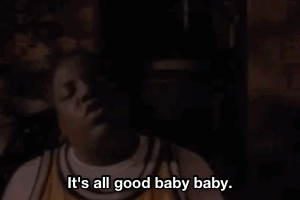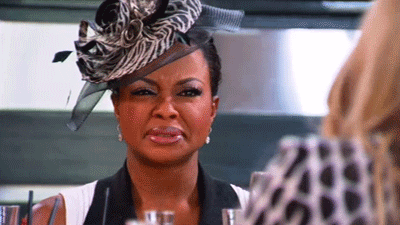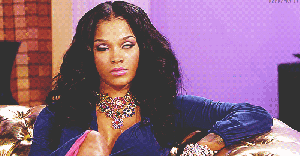Recently I stumbled over a new show Mahogany Momology, a podcast about Black motherhood!
Awww Yeah. I’m down for that.
AND these sistas had already dedicated an episode to adoption.
Super yay! New fan for sure!

via Giphy
I settled onto my elliptical this morning and listened. The show has a cool vibe. This episode on adoption left me with a lot of feels. Like, a lot of feels about all kinds of adoption stuff.

Via Giphy
I’m totally looking forward to hearing more from the show, but I found myself thinking that maybe there’s some more I could add to my own post from May, Thoughts on Being a Newbie based on the narrative I heard and didn’t hear on the show. Now of course, one show can’t be everything to everyone, so I respect that the episode focused on one family’s adoption story. So…yeah.

Via Giphy
Again, I’m hardly a sage, so take all of this for what it’s worth! Here’s my latest two cents to add to your considerations on the newbie experience.
- When choosing an agency, be sure that they engage in ethical adoption practices—this is for all kinds of adoption. Research them, feel good about how they treat you, how they view the child and how they view and treat that child’s family of origin. If this feels more transactional than family building, run, don’t walk to the next agency to check them out.
Another thing to consider is whether that agency is religiously affiliated and how that shapes they way they treat members of the adoption triad. Does the agency only work with couples? Do the couples have to be straight? Do the folks like me, single parenting by choice, also have to be straight? Is there a religious litmus test as a part of the process? How do they advocate for LGBT+ older kids who need homes who are invariably harder to place (because folks don’t want to be bothered with “other”)?
What about how much time do they give birth families to make their decisions about placement? Do they apply any pressure to birth families to decide early? How are birth families treated immediately following the birth? Is there different pricing fees for children of color? Why and how do you feel about that? How are families of color treated? How are children of color treated? Do they respect the dignity of children in need of homes?
Also, does the agency offer pre/post-adoption support? Are there opportunities for counseling referrals? Support groups? Help hotlines?
Choosing an agency is one of the most important decisions that you will make in this process. Ask lots of questions and try to get as close to right as you can.
- Learn about interstate adoption before you get deep in the process. The rules are different state by state. The delays in placement and ability to travel with a child immediately after placement are governed by these rules, or Interstate Compact on the Placement of Children (ICPC). These compacts also dictate the relationships between states when you adopt from foster care. For example, my daughter’s home state reimburses our state for her Medicaid coverage. We never saw a break in coverage, and it’s a financial negotiation between the states. She could not move from her state to mine until that and other things were all ironed out. Our paperwork was submitted right before Christmas, so things were delayed a few weeks; right after the new year, our ICPC went through and we could begin to plan for her permanent transition to my home. This step is really important so take some time to learn about it before you are waiting on it to happen.
- Think long and hard about an open versus closed adoption and put the child at the center of that decision. You and your feelings really shouldn’t be the priority. There I said it. You will have big feelings, super big feelings. HUGE feelings about this. Take some time to work through that and figure out what’s best for your child. Same advice goes for the birth family. Everyone needs to be on the same page here! Open adoption can look a million different ways, but please know that it is not simply a legal thing pertaining to original birth records, names, etc. I consider that a separate issue actually and actually mention it in my original newbies post.
The open vs. close question is about whether you are open to and willing to facilitate a relationship between your child and their biological family. There’s a lot of research on this (most of it pro-open), go Google it. Do your due diligence, not just for your comfort but for your child’s well-being.
Sure, it can be messy sometimes, negotiating boundaries, who gets called what, the various stages your child will experience as they grow in these relationships. I wrote about my own experience parenting Hope through an open adoption recently in The Gap. It has been challenging for numerous reasons, but I know having an open adoption is the right thing for us. We have access to medical history, which this year became exceptionally helpful, there has been reconnections that were important. Even in the challenging part, it has been an important way of Hope to have agency over how she wants to be in reunion.
I worry when the default decision is a closed adoption. There are numerous reasons for that choice, though, including safety and security of the child. But if you’ve chosen this path, be sure to center the decision on the child, not just what will be “easier” for you. It’s not about you.
- Spend some time really learning about trauma and attachment. A lot of domestic infant adoptive parents don’t think this is an issue for their kiddos. It may not always be, but I listen to a LOT of adoptees who often talk about that missing piece. They know things even when we think they (infants) don’t. Learn about trauma, learn about attachment. Learn what kinds of things you should be doing to facilitate attachment, learn that it might not look like what you think it ought to. There are lots of great resources out there on these topics. Check out The Primal Wound and Kathryn Purvis’ work on attachment and connected parentin Don’t assume that because your baby was placed with you a few days after birth that their mother’s essence isn’t imprinted in their senses. Come one, we learn about imprinting in nature in grade school; this shouldn’t be a foreign concept. Learn about this stuff and marinate on it. You may find down the road that it explains a lot that you just couldn’t figure out.
Hope wants me to add that that the wound can heal or at least find some resolution. It doesn’t have to remain painful and that every case is unique. She also notes that if you’re honest every step of the way with your kids that it makes it easier for everyone. #sheswise #thatsmykiddo
- Think about how you will talk about adoption (and foster care) with your child. I’ve made it a point to have an open policy on all topics in our home (which has led to some stunningly embarrassing moments, but seriously impactful moments). I want Hope to feel comfortable talking about her parents, her life experience before me, her feelings about her current relationship with her biological family, everything. If she had been an infant, I hope that I would have wanted to talk about her origin story, that adoption wouldn’t be a secret, that we would still have the open policy. I struggle when I hear about parents whose kids are beyond infant age, and they haven’t told them they were adopted. Um, what are you waiting for? #tryingnottojudge #effit #imjudging #sorrynotsorry Think about how you will share your child’s story with them and when (as early as possible).
So, I enjoyed the new podcast and I’m looking forward to checking out the previous episodes while Hope and I are on vacation this week! In the meantime, what other kinds of things do *you* think newbies should consider, know, learn? Share below and keep the discussion going!







